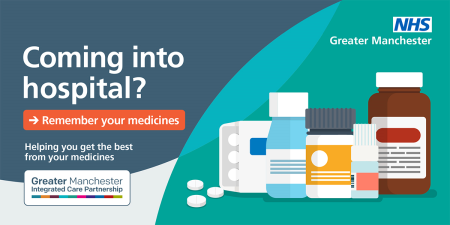Hospitals across Greater Manchester have launched a campaign called 
The region’s hospitals are making the ‘Your Medicines Matter’ plea to improve safety and provide a better experience for patients. It is important that patients bring in medicines from home because this will:
- help hospital staff decide on the best and safest treatments
- allow patients to continue taking medicines they recognise
- reduce waste and the cost of hospitals reissuing medicines patients already have
- help reduce delays when patients are going home
If patients cannot bring their medicines when they are first admitted, for example if they have come in as an emergency, relatives or carers will be asked to bring medicines in when they visit. By ‘medicines’, the hospitals mean anything that has been bought from pharmacies or supermarkets and patients are taking or using, as well as medicines that have been prescribed such as tablets, capsules, liquids, creams, inhalers, drops, injections and patches. It is also important the medicine is in the original packaging where possible.
Staff at hospitals will check the medicine patients bring in with them. If they are safe to use, they will be stored securely along with any other medication patients may need. When leaving hospital, staff will ensure patients have at least a seven-day supply of medicines to go home with.
Rob Elsey, Head of Strategic Pharmacy Transformation for the GM Provider Pharmacy Programme, said, “By reminding patients to bring their own medicines into hospital it allows us to get a quick and accurate picture of everything they are taking or using. This helps us to provide safe and appropriate care and means medicines are available to take from the start of the admission process.”
As well as helping to improve safety, if more patients remember to bring medicines from home it also reduces the cost of supplying duplicate medicines and reduce some of the region’s medicine waste. This also contributes to reduce the carbon footprint of the medicines, by using what has already been prescribed and purchased.
